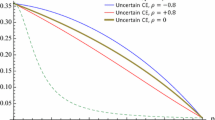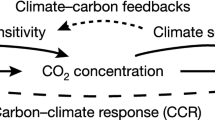Abstract
In this paper we show how to robustify the computation of equilibria in two integrated assessment models for climate change. Both models deal with the optimal timing of a transition to a ‘clean’ economy where a technology with low emissions but high energy cost can be used in the production process. The game represents the competition between industrialized and developing countries. A cost-benefit approach is implemented with an economic loss factor that represents the damages due to climate change. In the first model one assumes that both technologies, ‘dirty’ and ‘clean’ are available, but the economic loss factor is very uncertain. In the second model one assumes that the ‘clean’ technology is not yet available and some R&D investment must be made to get the technology breakthrough permitting its penetration. In this second model, formulated in continuous time, the jump rate of the controlled stochastic process describing the effect of R&D investment on the probability of breakthrough, is also considered as very uncertain. In both models we introduce a concept of α-robust equilibrium, where the robustification is achieved through the use of ambiguous probability distributions with a Kullback-Leibler divergence cost structure for the worst case choice by Nature.
At the time of this research the author “C. Andrey” was with ORDECSYS, Switzerland.
Access this chapter
Tax calculation will be finalised at checkout
Purchases are for personal use only
Similar content being viewed by others
Notes
- 1.
A divergence is a way to measure the distance between statistical distributions. Note that divergences need not satisfy the triangle inequality nor be symmetric.
References
Aghassi M, Bertsimas D (2006) Robust game theory. Math Program Ser B 107:231–273
Babonneau F, Haurie A, Vielle M (2013) A robust meta-game for climate negotiations. Comput Manag Sci. 10(4):299–329. Available on the web
Bahn O, Haurie A (2008) A class of games with coupled constraints to model international GHG emission agreements. Int Game Theory Rev 10:337–362
Bahn O, Haurie A, Malhamé R (2010) A stochastic control/game approach to the optimal timing of climate policies. In: Filar JA, Haurie A (eds) Uncertainty and environmental decision making. Springer, Berlin, pp 211–237
Bahn M, Chesney A, Gheyssens J (2012) The effect of proactive adaptation on green investment. Environ Sci Policy 18:9–24
Ben-Tal A, El Ghaoui L, Nemirovski A (2009) Robust optimization. Princeton University Press, Princeton
Bosetti V, Carraro C, Galeotti M, Massetti E, Tavoni M (2006) WITCH: a world induced technical change hybrid model. Energy J, 13–38 (Special Issue on Hybrid Modelling of Energy Environment Policies: Reconciling Bottom-up and Top-down)
Gerlagh R, van der Zwaan BCC (2003) Gross world product and consumption in a global warming model with endogenous technological change. Resour Energy Econ 25:35–57
Hansen L, Sargent T (2008): Robustness. Princeton University Press, Princeton
Leimbach M, Bauer N, Baumstark L, Edenhofer O (2010) Mitigation costs in a globalized world: climate policy analysis with REMIND-R. Environ Model Assess 15:155–173
Lempert R, Collins MT (2007) Managing the risk of uncertain threshhold responses: comparison of robust, optimum, and precautionary approaches. Risk Anal 27(4):1009–1026
Li X, Narajabad N, Borghan, Temzelides, Ted P (2014) Robust Dynamic Optimal Taxation and Environmental Externalities (January 27, 2014). CESifo Working Paper Series No. 4562. Available at SSRN
Manne A, Richels R (1992) Buying grennhouse insurance: the economic cost of carbon dioxide emission limits. MIT Press, Cambridge
Manne A, Richels R (2005) An integrated assessment model for global climate change. In: Loulou R, Waaub J-P, Zaccour G (eds) Energy environment. Springer, New York, pp 175–189
Manne AS, Mendelsohn R, Richels R (1995) MERGE: a model for evaluating regional and global effects of GHG reduction policies. Energy Policy 23:17–34
Nash J (1950) Equilibrium points in n-person games. Proc Natl Acad Sci 36:48–49
Nordhaus WD (2007) A review on the “Stern review of the economics of climate change”. J Econ Lit 45(3):686–702
Nordhaus WD, Boyer J (2000) Warming the world: economics of climate change. MIT Press, Cambridge, MA
Nordhaus WD, Yang Z (1996) A regional dynamic general-equilibrium model of alternative climate change strategies. Am Econ Rev 86:741–765
Pindyck R (2013) Climate change policy: what do the models tell us? J Econ Lit 51(3): 860–872
Stern N (2006) The economics of climate change. The stern review. Cambridge University Press, Cambridge
Todorov E (2009) Efficient computation of optimal actions. Proc Natl Acad Sci 106(28): 11478–11483
Tol RS (2002a) Estimates of the damage costs of climate change. Part I: benchmark estimates. Environ Resour Econ 21:47–73
Tol RS (2002b) Estimates of the damage costs of climate change. Part II. Dynamic estimates. Environ Resour Econ 21:135–160
Tol RS (2008) The social cost of carbon: trends, outliers and catastrophes. Econ: Open-Access, Open-Assess E-J 2(25):1–22
Acknowledgements
This research has been supported by the Natural Sciences and Engineering Research Council of Canada (O. Bahn) and by the Qatar National Research Fund under Grant Agreement no 6-1035-5126 (A. Haurie).
Author information
Authors and Affiliations
Corresponding author
Editor information
Editors and Affiliations
Rights and permissions
Copyright information
© 2016 Springer International Publishing Switzerland
About this chapter
Cite this chapter
Andrey, C., Bahn, O., Haurie, A. (2016). Computing α-Robust Equilibria in Two Integrated Assessment Models for Climate Change. In: Thuijsman, F., Wagener, F. (eds) Advances in Dynamic and Evolutionary Games. Annals of the International Society of Dynamic Games, vol 14. Birkhäuser, Cham. https://doi.org/10.1007/978-3-319-28014-1_14
Download citation
DOI: https://doi.org/10.1007/978-3-319-28014-1_14
Published:
Publisher Name: Birkhäuser, Cham
Print ISBN: 978-3-319-28012-7
Online ISBN: 978-3-319-28014-1
eBook Packages: Mathematics and StatisticsMathematics and Statistics (R0)




